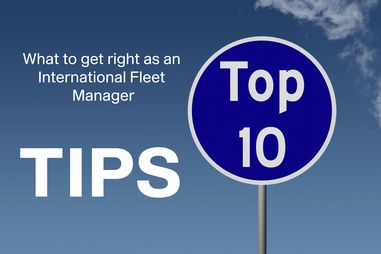Top 10 Tips

The modern fleet manager's role is a challenging one, no doubt. It's no rocket science, but it has become a great deal of science. The Top 10 Tips is a useful check list that is worth looking at if you are a starter, but not only, also for seasoned industry experts to go back to regularly.
0. Prerequisite: C-level support.
Securing C-level support is a prerequisite of any project, and applies to the complex ramifications fleet management has throughout an organization.
1. Expertise
Gain expertise fast from top qualified sources: talk to your peers, attend events, or buy consulting. Experts will broaden your understanding of the challenges and solutions ahead.
2. Data
Collect as much information as possible and review it regularly. Establish quarterly reviews with preferred suppliers and monthly engagements with your various markets.
3. Technology
Embrace technology, ensuring your tools fit with your mission, and start with a test run that involves a modest section of your fleet.
4. Outsource
Outsource what your organisation cannot manage appropriately in-house, to simplify management and free up colleagues from low-value burdens.
5. Communication
Get to know the purchasing and fleet managers throughout your markets to understand local differences. Listen and value employee satisfaction leveraging on company values.
6. Organisation
Create a cross-functional stakeholder team: procurement, HR, finance, facilities, and CSR. Review the policy together capturing needs in one document referring to mobility answers.
7. Develop the policy
Guide mobility from your policy: company cars, use of private cars, cash allowances, and mobility budgets. Place sustainability and employee satisfaction at the centre. Qualify mobility selection using recognizable and flexible criteria that endorse company values.
8. Processes
Instigate a lean process flow stripping out inefficiencies, a well-outlined vendor selection, and energy consumption KPIs to avoid missing CO2 and TCO targets.
9. Supplier relationships
Identify a manageably small number of OEMs and leasing companies, alongside one fleet management company that is closest to your needs, and develop those relationships.
10. KPIs
Identify a series of workable and meaningful KPIs that voice the work of the cross-functional stakeholder team consistently over time.